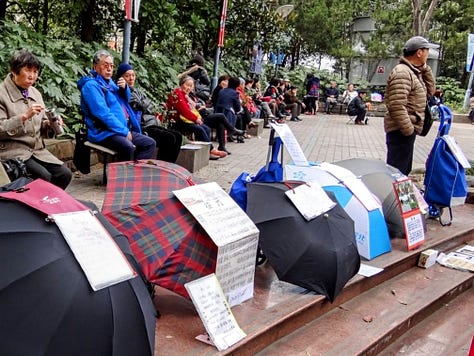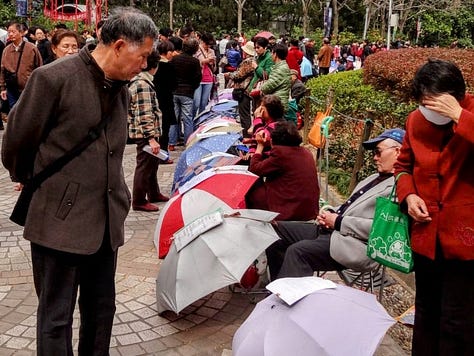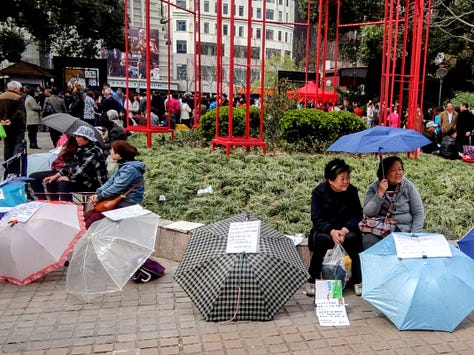Inside Shanghai's Marriage Market: the World's Largest Traditional Matchmaking Gathering
China's 200 million unmarried adults aged 20-49, delayed marriages among professionals, and evolving relationship norms have revived parental matchmaking
📍 People’s Park, Shanghai, China
In the heart of China’s most modern city, a uniquely traditional phenomenon unfolds every weekend. Shanghai’s Marriage Market draws hundreds of concerned parents eager to find suitable matches for their unmarried children. This age-old custom stands in stark contrast to the swipe culture of modern dating apps like Tinder, where superficial attributes often take center stage. Here, at the Marriage Market, practical qualifications and traditional values dominate.



A Cultural Crossroads
The Marriage Market is not just a place; it's a cultural crossroads, where the old meets the new, tradition lashes out at modernity, and familial concerns intertwine with individual aspirations. In a rapidly changing society, the Marriage Market provides insight into how China adapts to evolving relationships, marriage, and family dynamics.
To grasp its significance, consider the numbers: China boasts a staggering 200 million unmarried individuals aged 20 to 49. Among them, professionals increasingly delay marriage, departing from the earlier norm of early matrimony. This shift, coupled with evolving relationship norms, has resurrected the age-old role of parents as matchmakers.
The roots of the Marriage Market can be traced back to China's One Child Policy, which was in effect from 1979 to 2015. During this period, families were constrained to having just one child, leading to a gender imbalance with more men than women of marriageable age. But interestingly, it is primarily daughters for whom parents seek suitable husbands at the Marriage Market.
Parents of daughters often proudly flaunt their daughters' age, education, temperament, and sometimes even physical appearance. For sons, expectations extend to factors such as owning a car and an apartment, as evidenced by a Shanghai household registration record called a hukou. The high cost of living and property ownership in Shanghai further exacerbate the gender ratio gap at the Marriage Market, resulting in a notable overrepresentation of parents seeking relatively fewer qualified males for their daughters.
How the Market Operates
At the Shanghai Marriage Market, parents have two distinct options for discovering potential partners for their children: the "free zone" and the "amateur matching zone." In the "free zone," parents take on the task themselves, sifting through numerous advertisements containing comprehensive biographical details about the singles — including birth year, ethnicity, religious background, and marital history.
The "amateur matching zone" caters to parents who prefer the assistance of "professional" matchmakers. These matchmakers curate compiled lists of singles' profiles and contact information, streamlining the search process. It's worth noting that there exists a pricing discrepancy based on gender, where females pay a modest fee while males are exempt from charges. This pricing disparity reflects the higher number of females seeking partners in comparison to eligible males.
Cultural Significance and Criticism
Beijing pioneered this cultural phenomenon in 2004, but it's Shanghai's Marriage Market that has now claimed the title of the world's largest. The movement began as a gathering of retirees who, while participating in morning exercises, formed connections and shared concerns about their unmarried offspring. This grassroots tradition has since spread to other major cities like Wuhan, Hangzhou, Tianjin, and Shenzhen — all of which now have their own public matchmaking venues.
While arranged marriages are no longer the norm, the desire to select socially and economically advantageous partners remains strong. Marriage markets provide a platform to navigate these pressures, prioritizing the advancement of the family collective over individual preferences, in line with Confucian beliefs that emphasize family unity.
In contrast to traditional hūnyīn (marriage) customs, China's present cultural landscape has undergone significant changes. The 1950 Marriage Law abolished arranged marriages, male dominance, and neglect of children's interests. Further departing from traditional norms, the more recent celebration of singlehood on Singles Day on 11/11 — an intentional date, with the numeral 1 representing an unmarried man in Chinese internet slang — has become the world's largest online shopping event.
Critics of marriage markets often perceive them as prioritizing financial stability over happiness. In reality, these markets reflect the genuine concerns of traditional Chinese parents worried about their children navigating life without the safety net of marriage. China's market-driven reforms have indeed led to unprecedented improvements in income and living standards for billions. Nevertheless, rapid societal changes create uncertainty among traditionalists who fear the perceived risks of a capitalist and individualistic society. For like-minded traditionalists, the Shanghai Marriage Market offers solace, optimism for potential matches, and a way to preserve a cherished bygone era.




Discover Shanghai's Marriage Market, the world's largest traditional matchmaking gathering, as China's 200 million unmarried adults aged 20-49 and evolving relationship norms bring parental matchmaking into focus. 🇨🇳
https://superlative.substack.com/p/inside-shanghais-marriage-market